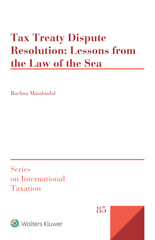2023 - Wolters Kluwer
E-book
Digital Version
Lectura en streaming | NO Descarga | NO Copiar/pegar | NO Impresión
Tax Treaty Dispute Resolution : Lessons from the Law of the Sea
272 p.
- Stakeholders in the international taxation community agree that existing dispute resolution processes are in serious need of improvement, and a global consensus must be achieved. This book offers a potential restructuring of the tax treaty dispute resolution system based on a comparative analysis of the dispute resolution mechanisms under tax treaties, as prescribed in the OECD and UN models, on the one hand, and the UN Law of the Sea Convention (LOSC) on the other. This comparative study is the first of its kind and is premised on certain key geopolitical similarities that underpin the international tax regime (ITR) and the law of the sea regime while taking into consideration the differences in the institutional context of both regimes. The author proposes a new tax treaty dispute resolution system based on the LOSC system for resolving multilateral tax disputes, focusing on the following: mapping of the institutional arrangements that make up the dispute resolution mechanisms to understand how each system.
- works;comparative analysis of the patterns of interaction and outcomes generated across the two dispute resolution systems to identify relevant aspects of the LOSC system that may be adapted in the ITR to improve tax treaty dispute resolution; andanalysis of the inclusivity levels across the decision-making structures under each system to identify specific consensus-building techniques that may facilitate the implementation of the new proposed tax treaty dispute resolution system and also enhance international cooperation across the ITR. The proposed restructuring of the tax treaty dispute resolution system expands the existing mutual agreement procedure and forms a comprehensive legal framework that aims to achieve a more effective, predictable and equitable resolution of multilateral tax disputes in the 21st-century ITR by striking a balance between countries' right to tax sovereignty and the rule of law. Just as the design of the dispute resolution system under the LOSC paved the way for universal consens
- us of the Convention among almost 160 countries, the author's new tax treaty dispute resolution system also offers a solid foundation for consensus-building towards a universal treaty in the ITR. Everyone concerned with international tax dispute resolution - whether policymaker, in-house counsel, national tax authority official, judge, tax lawyer or academic - will find the truly valuable analysis here, not elsewhere. [Publisher's text].
- Special access authorizations may apply; please contact us for further information.
-
Información
ISBN: 9789403534275
COLECCIÓN


